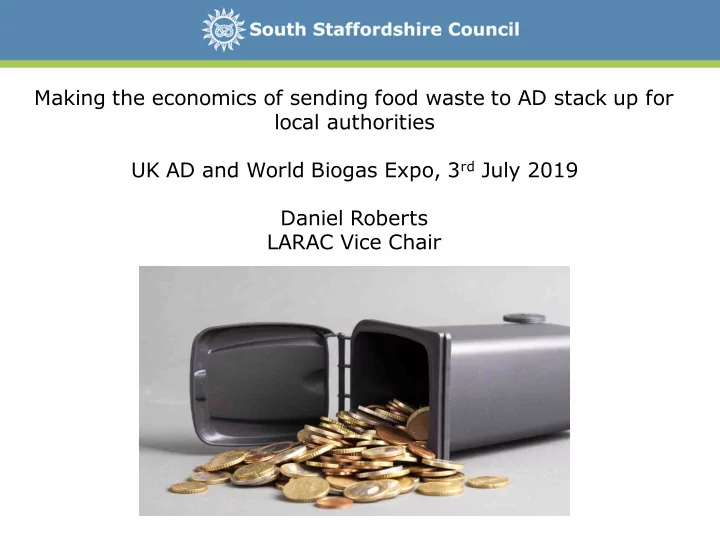

Making the economics of sending food waste to AD stack up for local authorities UK AD and World Biogas Expo, 3 rd July 2019 Daniel Roberts LARAC Vice Chair
RAWS 2018 DEFRA Resources and Waste Strategy (December 2018) To work towards eliminating food waste to landfill by 2030 (one of five strategic ambitions). Reducing greenhouse gas emissions from landfill by ensuring that every householder and appropriate businesses have a weekly separate food waste collection. Legislation for mandatory separate food waste collections (2023). “Depending on how packaging producer responsibility is reformed, recycling credits and two- tier cost sharing more generally will need to be reviewed”.
RAWS Consultations DEFRA Consultation on Consistency in Household and Business Recycling Collections in England (February 2019) By 2023 we propose to legislate for local authorities to provide all kerbside properties and flats with access to at least a weekly separate collection service for food waste, including provision of containers and liners. Which aspects of the proposal do you agree and disagree with? At least a weekly collection of food waste. Agree A separate collection of food waste (i.e. not mixed with garden waste). Agree Services to be changed only as and when contracts allow. Agree Providing free caddy liners to householders for food waste collections. Agree
Considerations Insufficient focus on food waste prevention: economic, environmental and moral imperative. Funding concerns: what does “new net costs” incorporate? Long term, operational and capital costs? Containers, infrastructure, collection and reprocessing costs? Recognition of non-uniform distribution of reprocessing infrastructure? Funding must be for all LAs and recognise individual circumstances. Government funding to LAs will reduce by 60% between 2010 and 2020 (LGA). Cost of collection often overlooked. £180 per tonne for some LAs: reprocessing cost of £26 per tonne (WRAP Gate Fee Survey 2018 median average). Funding must recognise unique LA factors (e.g. rurality, density, demographics, access to appropriate facilities, existing collection services).
Considerations “IVC and MBT require mixed organic feedstocks with some amount of food waste to work optimally, and it is possible that separate collection of food waste may compromise the viability of these technologies”. DEFRA ‘consistency’ consultation (p28) “We estimate that something like 60 or so LAs are involved in long term contracts. Most of those facilities will have been designed and built and are operating on an assumption of the feedstock they will receive”. Ian Fielding, Chair of ADEPT Waste Working Group at HCLG Committee Enquiry (11 th June 2019) Of top 10 performing LAs in 2017/18 (DEFRA 2018) 3 collect food and garden waste commingled. “Where a weekly food waste collection is provided, our analysis assumes that weekly collection of dry recycling will also be provided”. 35% of LAs in England operate a separate food waste collection and just 20% of LAs in England operate a weekly multi-stream recycling collection.
Financial support What should financial support include? Operational and capital cost of collection o (vehicles, crews, infrastructure [e.g. depots, transfer stations]). Cost of collection and disposal contract changes. o Procurement and legal support for changes o to/new collection and reprocessing/disposal contracts. Initial and ongoing cost of caddies (internal and o external, including replacements), liners. Communication initiatives (national and local). o Concern that post-collection commingling of food and garden waste may be counter productive to efficient collection systems, increase costs and environmental burdens and undermine recycling message.
WRAP “However delivering this level of financial benefit would be challenging and it may be difficult for some authorities to realise the benefits modelled.” WRAP Support evidence and analysis: the case for greater consistency in household recycling (2016) “However, for the 80% or so of the ‘pilot’ authorities currently with no weekly food waste collection and operating a fortnightly residual collection, here the opportunities for further savings or ability to add food waste at no additional cost were limited.” Linda Crichton, WRAP introducing the report ‘Greater consistency in household recycling: summary of local authority business cases’ (LetsRecycle, 22/11/17) LARAC membership survey (2019): 67% of LAs that have conducted options appraisals for separate food waste collections saw overall cost increases. 39% of UK LAs collect food waste separately (reduces to 35% for England only) WRAP (2017/18). Consistency consultation (Q34): “we propose to use the guidance to set a minimum service standard for residual waste collection of at least every alternative week” . Will further impinge LA ability to deliver services.
WDAs, WCAs and UAs In the case of Staffordshire…… “Introducing a food waste collection across the Partnership could drive up recycling rates and reduce residual waste. However, the costs increase, irrespective of how the food is collected, for both collection authorities and from a whole system basis”. Ricardo/WRAP review of Staffordshire Waste Partnership (2016 and 2017) WDAs and potentially UAs more likely to benefit from separate food waste collections compared to WCAs: distribution of costs/savings? Extent of WDA and UA benefit depends partly on local disposal/treatment costs: Landfill = £88 to £168 per tonne (non-hazardous waste o including landfill tax, 80 gate fees reported) EFW = £33 to £117 per tonne (pre and post 2000 o facilities, 62 gate fees reported) AD = -£5 to £68 per tonne (62 gate fees reported) o WRAP gate fee survey 2018
Summary LARAC supports true full net cost recovery for all LAs: but who will pay? Cost of food waste collections must be calculated for individual LA circumstances: generic, nationally aggregated figures will not accurately reflect true LA costs. Local sovereignty and accountability (e.g. frequency of residual waste collection). Need for aligned policies and levers. LAs cannot compel residents to recycle (decriminalisation of S46 offences). Impact on other LA services: concern if food waste costs compete against statutory services such as education and social care. Not all LAs will benefit from service change. Funding must recognise and manage disproportionate impacts.
Recommend
More recommend